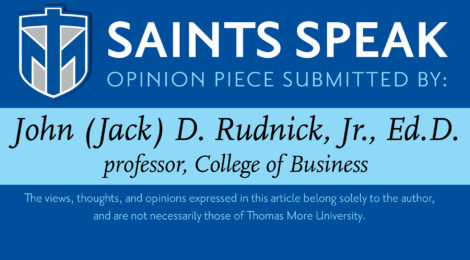
Opinion: Servant Leadership Style from Healthcare Offers Model for Introspection
Submitted by: John (Jack) D. Rudnick, Jr., Ed.D., professor, Thomas More University
One of the philosophies that defies a common understanding of leadership is a model known as servant leadership. The paradox is that this model is characterized, inherently, by the desire to serve others by seeking the well being of followers and provide them with the necessary support to achieve goals. Servant leadership is a mindset that is counter-intuitive to the common understanding that leadership requires the pursuit of power, authority, or self-promotion to advance an agenda. As a result, many situations and work environments find this prescriptive style to embody the core values targeted by healthcare entities.
In the leadership world, where a continuum of models that include authoritarian, transactional, and transformational styles exists, servant leadership takes its place as an important consideration for situational decision-making throughout all aspects of broad disciplines. Many immediately link servant leadership to faith bases as this philosophy characterizes the model embraced by Jesus Christ, Nelson Mandela, Gandhi, and St. Mother Teresa.
Healthcare is well suited to servant leadership. The alignment between the values fostered in healthcare and the principles of servant leadership combine to achieve compatibility of this model. Caring for others is among the ethical and professional values and is a basic tenet of servant leadership.
In 1977, Robert Greanleaf coined the term in his essay “Servant Leadership: A Journey into the Nature of Legitimate Power and Greatness.” The following excerpt from this essay offers a general description for application in both secular and faith-based organizations: The servant leader is servant first. It begins with the natural feeling that one wants to serve, to serve first. Then conscious choice brings one to aspire to lead. That person is sharply different from one who is leader first, perhaps because of the need to assuage and unusual power drive to acquire material professions… The leader first and the seventy-first are two extreme types. Between them there are shadings that are part of the infinite variety of the extremes. The best test to administer is: Do those served grow as persons? Do they, while being served, become healthier, wiser, freer, more autonomous, more likely themselves to become servants? (www.greenleaf.org)
Leadership self-awareness and emotional intelligence (popularized by George and Goleman respectively) are two fundamental constructs taught in leadership and management classes throughout the world. As core values define healthcare entities, so too does the mindset and elements of servant leadership in a profession rooted in caring and empathetic values.
Healthcare is a vocation, a calling, and a profession that draws people who seek to become “self-actualized” in the management hierarchy defined and popularized by an atheist—Abraham Maslow. A little known fact is that self-actualization is not the final rung of his globally accepted pyramid for defining the complete self. Spiritual or self-transcendence are actually used to characterize his realization late in life that there is more to self-fulfillment; a higher purpose defines an ability to become whole and complete.
So, too, each leader must dig deep using objective tools such as the Myers-Briggs Personality Profile, DISC, and Gallup’s Strength Finders to characterize the personal self coupled with the academic works of leadership experts and management theorists to establish a personal philosophy of leadership to define our personal self and approach to a chosen career.
Servant leadership has its place among the continuum of choices for leaders. A “situational template” is prudent to frame context. It is not always a practical model to embrace. Authoritarian model characteristics must be practically applied in operating and procedure rooms where the physician is “the captain of the ship” by authority and must command how processes unfold. Similarly, guidance must be provided for task-completion in business operations—however, the reality is that with razor-thin margins in an environment of free-fall change, there is often not the luxury of employee associates “finding their true selves” in every day-to-day experience. Rather, Servant leadership can be viewed as a marathon in the race of life–crafted, developed, and molded through an individual’s collective education, background, and experiences.
It is possible to embrace and foster the values proposed in this sympathetic and caring philosophy, as conveyed by healthcare entities convey in the gist of their missions. One can realistically find a balance and embrace the core values that characterize this model through introspective assessment, reflection, and intentional choice.
John (Jack) D. Rudnick, Jr., is a tenured professor at Thomas More University in the Department of Business Administration and Accountancy. He served as a healthcare administrator in the U.S. Navy Medical Service Corps and as a physician/medical programs recruiter. He also served as chief operating officer for a large specialty medical group practice and ambulatory surgery center, administrator for long term care facilities, director for a school-based health center initiative, and vice president for large healthcare systems.
The views, thoughts, and opinions expressed in this article belong solely to the author, and are not necessarily those of Thomas More University.

Comments are closed, but trackbacks and pingbacks are open.